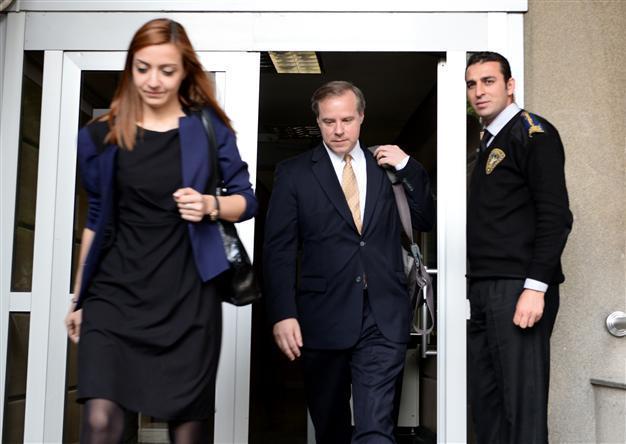Turkey and Twitter find ‘common ground’
ISTANBUL

Twitter’s head of global public policy, Colin Crowell (C), met with Turkish officials in Ankara, April 14. AA Photo
Twitter officials have accepted Turkey’s demand to act “more quickly and in a more sensitive manner” regarding rulings by Turkish courts, the semi-official Anadolu Agency has reported.
Turkish officials urged executives from Twitter to open an office and start paying Turkish tax on April 14 in the first direct talks following a two-week ban that was imposed on the site amid government efforts to prevent damaging corruption revelations from reaching the public.
“Common ground has been found between Turkey and Twitter,” the semi-official Anadolu Agency said.
A senior Turkish official told Reuters that Twitter’s head of global public policy, Colin Crowell, was holding two rounds of talks in Ankara with the aim of opening up a better channel of communication. He described the first meeting as “positive.”
“The aim is for the company to pay tax and to resolve the problem of meeting Turkey’s just demands by opening a representative office here,” he said.
The government estimates that Twitter generates $35 million a year in advertising revenue in Turkey, none of it taxed by Ankara, he said. There was no immediate comment from Twitter.
Removal of tweetsTurkey has also said it wants the removal of tweets it believes harms national security, the privacy of individuals and personal rights, and wants Twitter to hand over the IP addresses of those accounts which it views as a threat.
Last week the head of Parliament’s constitutional commission, Burhan Kuzu of the ruling Justice and Development Party (AKP), applied to the Constitutional Court, seeking a renewed block on access to Twitter on the grounds of a personal insult against him.
Anadolu reported late April 14 that there had been “positive developments” in the latest round of talks between Twitter executives and Turkish officials.
As Turkey presented two or three different “communication models,” Twitter officials said they would make evaluations by comparing them to their own mechanisms before issuing a reply. Executives also said they were not “categorically against” opening an office in Turkey.
The Twitter delegation led by Crowell also met the advisers of President Abdullah Gül on April 15 behind closed doors.
Blocking before the electionsPrime Minister Recep Tayyip Erdoğan’s government blocked Twitter and YouTube ahead of local elections last month, drawing international condemnation, after audio recordings, purportedly showing corruption in his inner circle, were leaked on their sites.
The block of Twitter was lifted 10 days ago after the Constitutional Court ruled that it breached freedom of expression, a decision Erdoğan has since said was wrong and should be overturned.
The prime minister has continued his salvos since the Constitutional Court ruled that the blocking of the website was unconstitutional and accused Twitter of being a “tax evader” on April 12.
“Twitter, YouTube, Facebook, these are international companies. They’re companies established for profit,” he said at the opening ceremony for a purification plant in Istanbul.
“We will deal with them. They will come like every international company and comply with my country’s Constitution, laws and tax rules,” he said, repeating his combative stance ahead of the talks between his government and the San Francisco-based company.
Turkey said at the time of the ban that access would be restored if Twitter appointed a local representative, paid tax and agreed to block specific content when requested.
Like many technology companies, Twitter uses a non-traditional but highly tax-efficient business structure.
Its international headquarters are in Dublin but it also has offices in cities from Amsterdam and Paris to Rio de Janeiro and Seoul, according to its website, where staff market advertising services, mainly to business customers.
However, customers in countries like Turkey, Germany and Britain transact directly with the Dublin-based Twitter International Company, terms of business on its website show.
Staff in subsidiaries in countries like Germany and Britain market the company’s advertising services to local customers and these subsidiaries are funded by payments from other Twitter companies, like Twitter International, their accounts show. This structure can ensure that Twitter subsidiaries in such countries report little profit and pay little tax.
The Organization for Economic Cooperation and Development (OECD), which has been tasked by the G-20 with devising a blueprint to crack down on corporate tax avoidance, has criticized such structures, as have parliamentary investigations in the United States and Britain.
